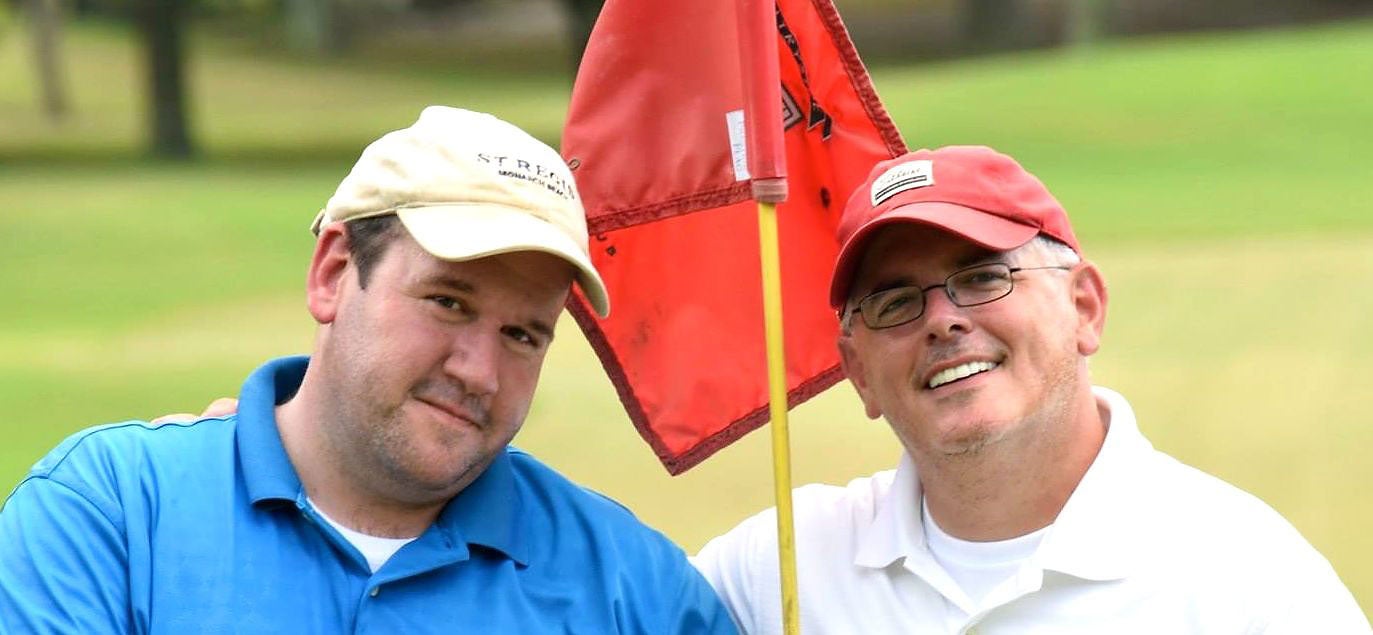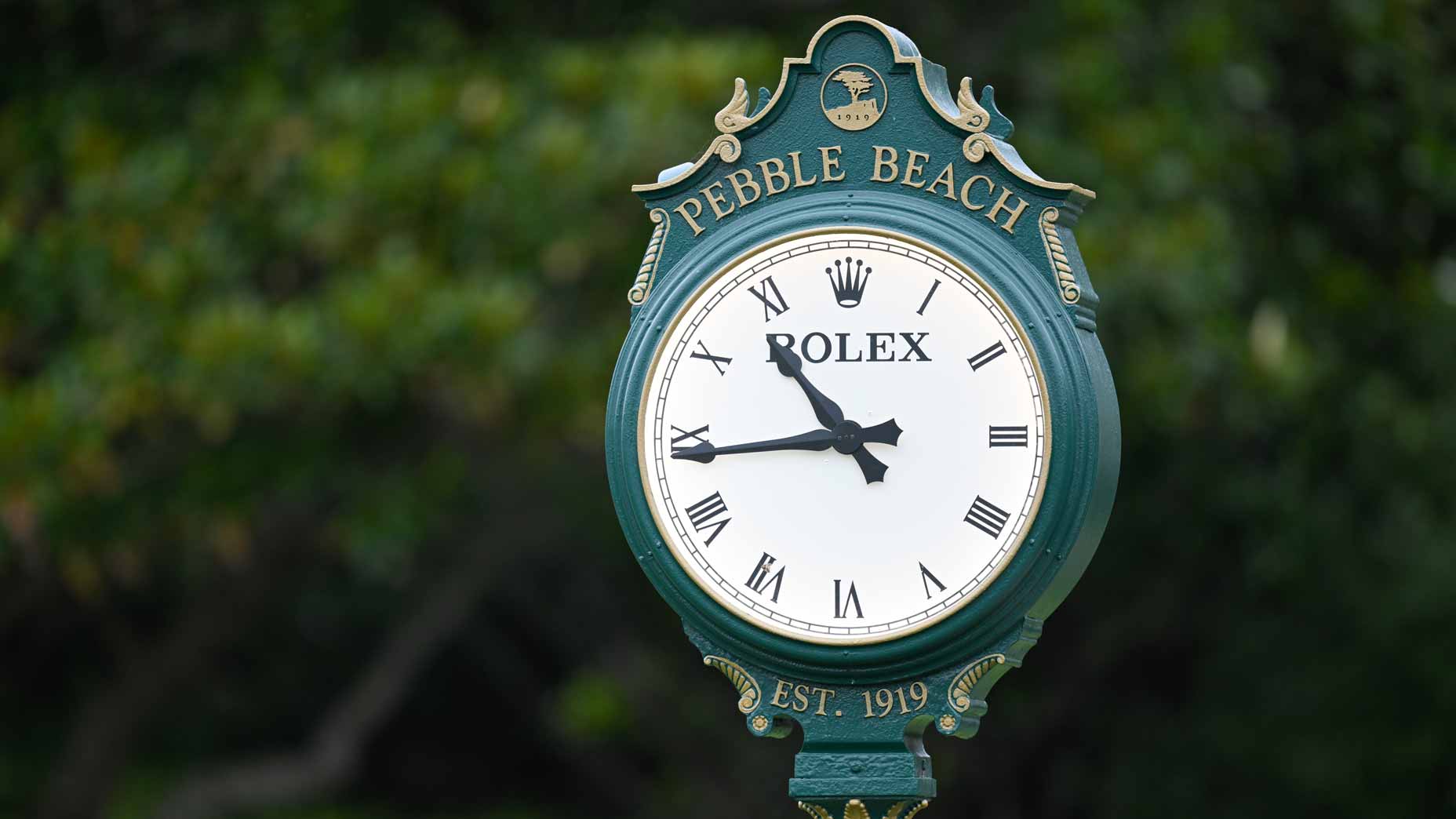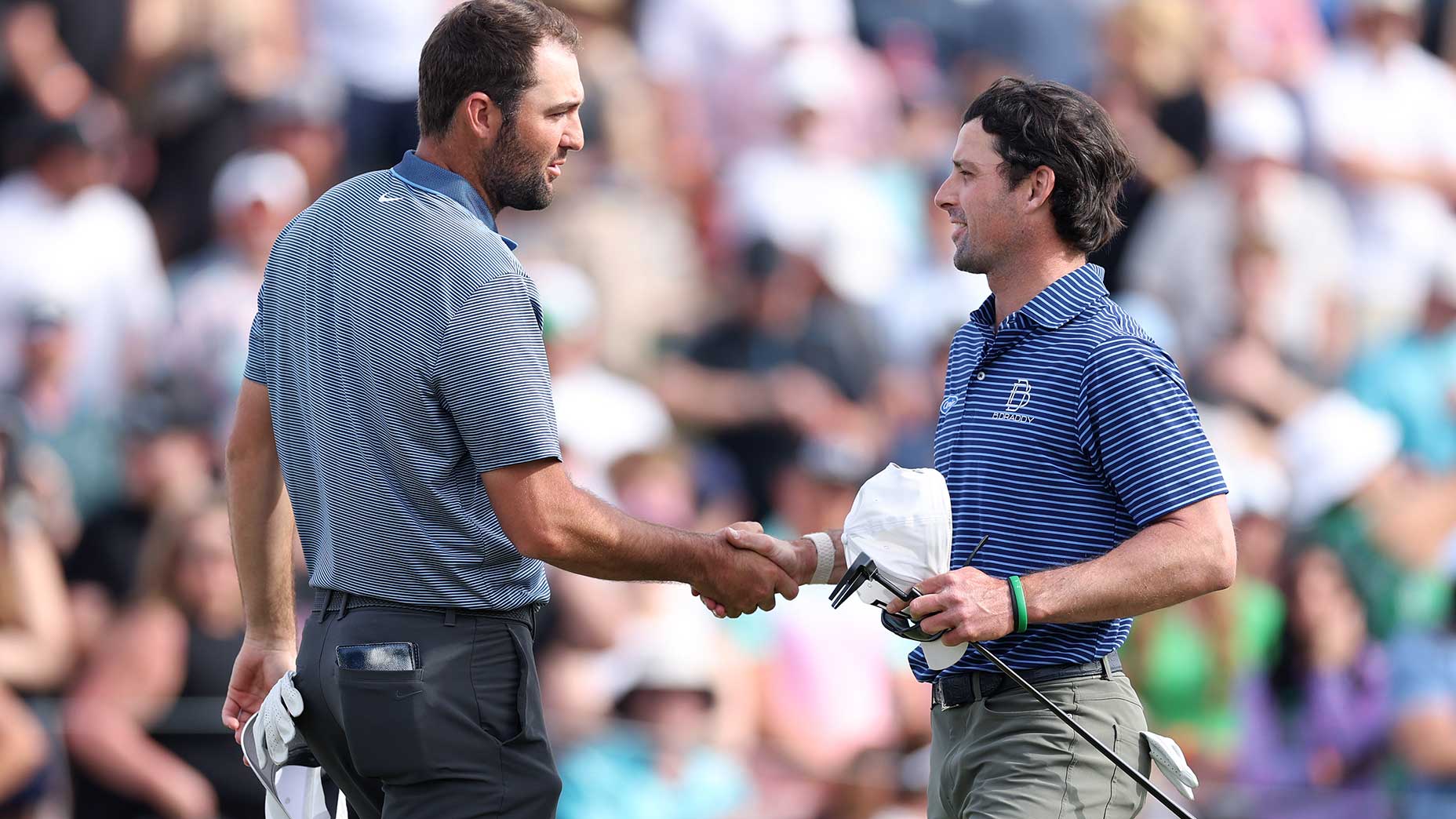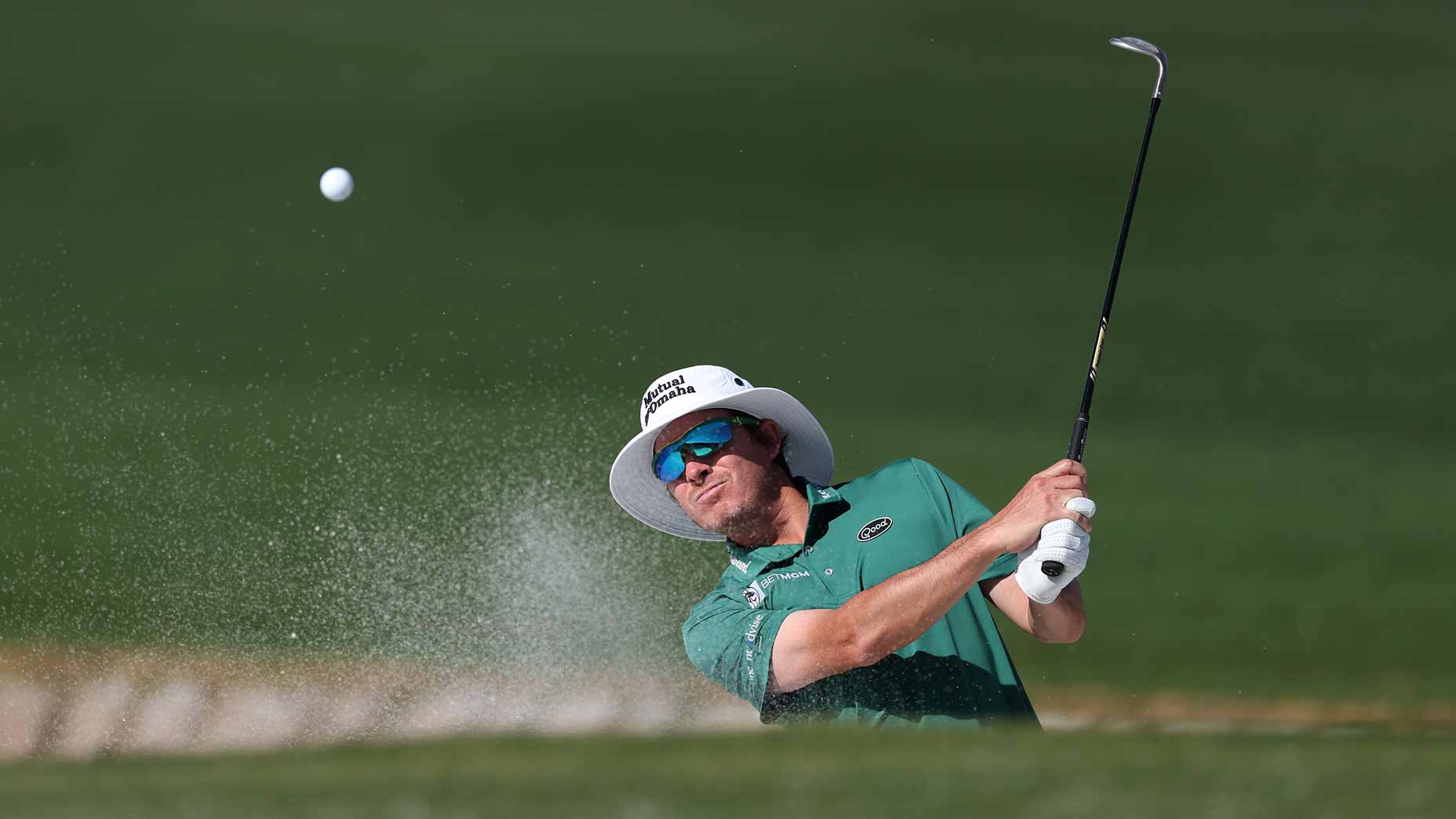I like Patrick Reed. His swagger. His talent. His cherubic good looks. But when late last year microphones caught Reed uttering a gay slur after he missed a short putt, I was disheartened, if not all that surprised. After all, the f-word isn’t exactly uncommon.
The incident and ensuing uproar made me think not only about the absence of openly gay players on the PGA Tour but also about my own experience as a gay golfer: Did I putt like a f-ggott? Was I effectively a one-man gay pride parade every time I teed it up? And why are my partner David and I the only openly gay men we know with a golf club membership?
That last question especially interests me.
I took up golf at 39, when I became a partner at a large consulting firm near Washington, D.C. Our company, where David is also a partner, was hosting a scramble, and I wanted to show my support by participating. I’m athletic; I used to play lacrosse competitively. How hard could golf be? That misguided thinking led me to our local golf shop where a persuasive saleswoman talked me into $3,000 worth of clubs. (I was officially all in!) I picked up some new duds, too, because if my game wasn’t going to look good, I sure as hell was.
The golf bug bit me hard. Despite flubbing virtually every shot at the outing, I wanted to play more. A lot more. David was amused. After my equipment splurge, he looked at me and said, “If you’re spending that much, you are going to play.”
“If I’m playing, so are you,” I said.
A loyal partner and fierce competitor, David couldn’t resist. He dashed out and bought his own clubs. That was almost seven years ago, and so began an adventure that will last the rest of our lives.
The Search for a Club
Neither David nor I ever imagined we’d join a golf club. We both come from blue-collar backgrounds — country clubs just weren’t in our DNA. Besides, what club would welcome in a same-sex couple? We pressed on, though, motivated mostly by economics. At the time we were playing four to six times a month. Green fees and travel expenses were a significant investment. Also, we weren’t playing enough to truly improve. A club membership, we reasoned, would allow us to save money, play more and — who knows? — maybe find more golfers like us.
We live in Arlington, Va., right outside Washington, D.C., a hotbed for golf clubs. Financially, not much was off limits to us. Our priority was finding a spot near our home that offered amenities beyond golf. We toured many clubs, some nationally renowned. We listened to pitches, zipped around properties on golf carts, and inquired about initiation fees and waiting lists (10 years and a non-refundable down payment? Are you serious?!).
At the end of each meet-and-greet, we’d ask a simple question, “How do you deal with us?”
The response would generally come in the form of awkward “ah-hems,” restless shifting in seats and the occasional mumbled “Sorry, what do you mean?” When our search began, we’d agreed not to disparage clubs that rejected us for being gay. After all, private clubs are by nature self-selecting associations, and while their homogeneity has undoubtedly contributed to their long-term struggles, we weren’t on a crusade. We simply wanted to find a membership that would embrace us.
Several clubs subtlety refused us or said that we could each join as single members, which would require us to pay twice the dues, fees and initiation. That hardly seemed fair. But that’s the thing with private clubs—they can make arbitrary rules that are difficult to challenge. We walked away from those clubs wiser, if somewhat despondent. Perhaps we needed to reassess our strategy and wait for clubs to catch up with modern times, assuming they survived that long.
Then we visited Army Navy Country Club.
ANCC, as it’s known, was established in 1924 and has two campuses: one in Arlington, near the Pentagon, and another in the nearby suburb of Fairfax. At the time, the club was undergoing a major renovation of both its clubhouse and course (some of the 54 holes were designed by Donald Ross) with the goal of revitalizing its membership. ANCC was perfect. It was just two miles from our home, we felt comfortable there and it already had a number of gay members, if not openly gay members.
David and I are quite “out.” We don’t hide our relationship from anyone and have no interest in assuming a lifestyle that would force us to do so. We knew that if we joined ANCC, we would be outliers, the only truly openly gay couple. We had to be certain that we could handle the heat if we inadvertently created an “issue” for the club. After two weeks of weighing the pros and cons, we decided that we wanted in.
When the paperwork cleared and we were officially approved as members, the darndest thing happened: The earth didn’t open and swallow the club in a hail of fire and brimstone. We weren’t met at the gates by a pitchfork-toting mob. Our initiation was remarkably… unremarkable. That was nearly three years ago.
Life as a Gay Member
As new members, we felt that it was important to be seen and to be active — to help demystify what it means to be gay. David and I prepared ourselves for the inevitable microscope and decided that for the first few weeks we’d “man” up our appearances a bit. With new, tightly cropped haircuts and more conservative clothes (yep, polos and khakis), we entered into country-club life.
In our first round at ANCC, we were paired with an affable retired one-star general who had served in Iraq. On what was our 16th hole, David skulled a chip that hit the general squarely in the chest. He took it well but hasn’t played with us since. I’d like to think that’s because of our shaky swings and not because of our orientation. A week or so later we encountered a fuller measure of country-club life when we were paired with an older gentleman who still played with persimmon woods. It was a Sunday morning and, as is customary, the pace was a bit slow. The man, probably in his 70s, glared at the group ahead of us and remarked with disgust, “That wouldn’t have happened in my day.”
The foursome was all women.
In his day, he explained, spouses (read: women) were not permitted to play before 11 a.m. We didn’t have the heart to tell him our situation.
Our first real “issue” came a few months later. During a busy holiday weekend, David and I were playing as a threesome with a new friend. In the middle of the round, David chipped his ball over a green and into some woodchips. A player in the group ahead picked up the ball and slipped it into his bag. When I asked for the ball back, he became agitated, explaining that he had “waved” the ball in the air. Because no one claimed it, he contended, it was his to keep. After a few more moments of heated discussion about just “wanting to have a nice day” with his daughter who was home from college, he hurled the ball at David. Uncertain of the ruling, we allowed David to play the ball as it lied without penalty and went on our way.
After the round, another retired one-star general (there are many at ANCC) confronted us and demanded to know what had happened and why we had used profanity. David chirped up: “This gentleman was totally in the wrong. He picked up a ball in play and wouldn’t return it. Aren’t my partner and I entitled to enjoy our round at least as much as this member and his daughter, or does that only apply to straight people?”
After a moment of perplexed calculus, the general quickly retreated.
Being gay in the golf world is an odd dynamic. A couple of months ago, David and I took a road trip through the South. Our last stop was at a well-known golf resort where we had booked a single room with a king bed. Shortly before arriving, I called to confirm the reservation and learned that the hotel had changed our request to two full beds. They hadn’t realized we were a couple.
“But we are a couple…” I began.
They told us they would amend the reservation, but when we checked in we discovered the booking was still for two beds. I don’t believe there was any malicious intent. I just think the notion of a gay couple on a golf trip was more than they could process.
Back at the club, David and I have made great friends, and others who turned out not to be the kind of friends we’d hoped for. (Note to those of you who like the idea of having a token “gay friend”: We are not something to be collected.) On the course, we’ve encountered no other major issues beyond the latent homophobia that permeates most sports. It’s disturbing how frequently I hear male golfers calling themselves a “fag” or a “Mary” for leaving a putt short.
David and I have made a game of seeing how long it takes our golf partners to figure out our relationship. Golf talk with strangers typically begins with questions about marriage, kids, dogs, where you live. As David and I respond with the same answers, one after another, our playing partners eventually catch on, usually somewhere between the 9th and 13th holes. We’ve had only a few partners quit on us at the turn, having suddenly “remembered” a previously scheduled appointment. Some members have really engaged with us, but most couldn’t care less who we are as long we don’t hold up play.
Why Golf Clubs Should Loosen Up
Private golf clubs in America are struggling. According to the National Golf Foundation, private club memberships are down on average 13% since their peaks and rounds are down 17%. Many clubs are cemented in a bygone era and haven’t made enough of an effort to enter the new millennium. “Build it and rich white people will come” seems to be a mantra that they can’t get past, even though it’s no longer a sustainable business model.
For clubs to thrive and remain relevant in our society, they should aim to attract a wider range of members and establish ecosystems that will allow them to prosper. Our club, for example, has made a concerted effort to attract a younger and more diverse membership. We’ve redone the clubhouse, added tennis courts and junior tennis courts, along with more outdoor space. There’s talk of expanding the swimming facilities and re-doing the secondary clubhouse in Fairfax. The average age of our membership has dropped from the late 60s to the 50s.
David and I made a great choice. We love the game and we’ve come to love our club despite the occasional hiccups. We’ve shaken things up and altered how at least a few people think. Or at least we hope have. We’ve even helped a few closeted gay members come out at the club without fear; one member, an Annapolis grad, told us he didn’t add his partner as a “spouse” or “guest” member lest people learned that he was gay. We’ve also acted as a sounding board for members with gay children. Perhaps what these members see in us is that their kids can do or be anything. They can work for the CIA, run a business, or, yes, even join a golf club.
Ultimately, though, David and I don’t want to be seen as trailblazers or pot-stirrers. We simply want our fellow members to see us for exactly who we are: two guys who are crazy about golf.
Roger Hockenberry is CEO of Cognitio, a strategic cybersecurity consulting firm in McLean, Va. He and David recently celebrated their 13th anniversary.
For more news that golfers everywhere are talking about, follow @golf_com on Twitter, like us on Facebook, and subscribe to our YouTube video channel.







